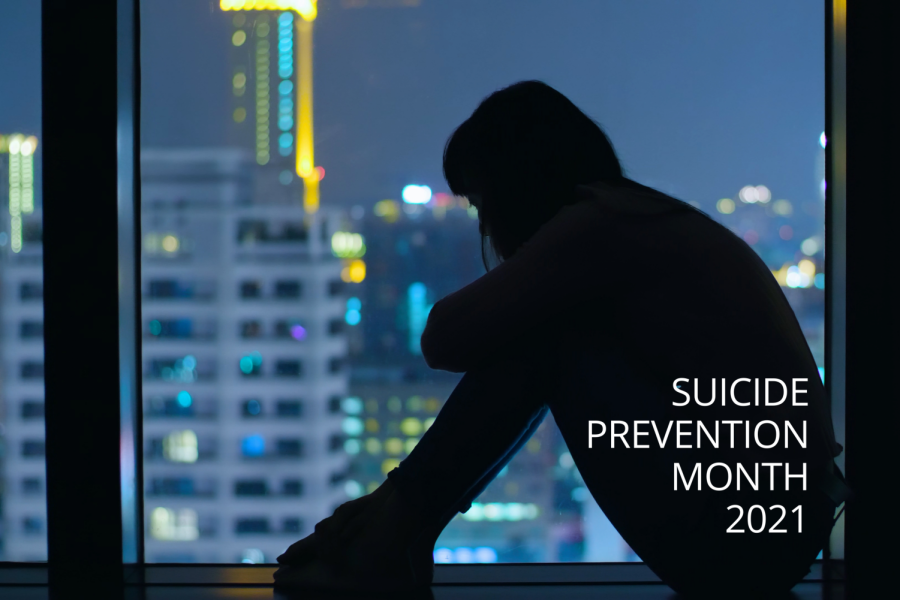How we can all prevent suicide
National Suicide Prevention Month
Teenage suicide mortality rate has risen for 20 consecutive years, and suicide is now the second leading cause of adolescent death in Taiwan, according to the Ministry of Health and Welfare. The rate has climbed from 4.0% in 2000 to 8.8% in 2020, an increase of more than two times. For every suicide, there are more than 20 suicide attempts, according to the World Health Organization (WHO).
Suicide does not discriminate, and Taipei American School is no exception from falling victim to this public health crisis. A junior at Taipei American School died by suicide in February. The death affected many in our community, through grief and loss, and a renewed recognition of mental illness as a major, relevant issue.
The recurrence of this tragedy can be prevented by raising awareness in our community about ways to cope with suicidal ideation and ways others can help those who are struggling. No less important is to change our societal attitude toward mental illness and suicide.
If you are struggling
Do not suffer in silence.
Negative stigma surrounding mental illness and suicide can add significant resistance for you to speak truthfully about your thoughts and feelings. However, sharing those thoughts with a medical professional or someone you trust is the single most critical step to recovery.
“Opening up about it, I’ve seen it really change people’s lives,” Upper School Psychologist Mrs. Sherri Lee Grande said. “I also see people [who] keep it inside for so long and just really suffer.”
Assumptions about troubling others by opening up may also deter you from reaching out for help. But suicidal thoughts suggest a life-threatening health condition, which is why you must prioritize your own treatment over your concern for others’ reception.
“When I speak with students who have suicidal thoughts,… they’re afraid to speak up because they don’t want to burden other people,” Mr. Ryan Haynes, director of academic and personal counseling, said. “[But] if you don’t speak up and share, [others] just assume everything’s okay.”
If you notice your suicidal thoughts recurring, take a pause in your life.
These thoughts are a red flag indicating that your current life is unsustainable and most likely unhappy. It is vital that you take a break to reflect and make changes that fuel your mental strength and resilience to ultimately recalibrate your life and make it more manageable. An example is to take on a half-day schedule at school for a period of time.
“Sometimes it’s just saying, ‘Okay, let’s just stop.’ We all feel like our daily routine is so important, like if I don’t take this test, or if I don’t do this, everything’s gonna fall apart,” Mrs. Grande said. “[But] usually, if you just stay on the same path, it doesn’t get better.”
Suicidal thoughts are most often ephemeral. Nonetheless, they must be regarded with gravity. “It’s always a warning sign that something isn’t right or something needs to change in your life,” Mrs. Grande said. “Those are the kind of thoughts that you should never ignore.”
In this step of reassessment and adjustment, avoid comparing yourself to others and start recognizing your own needs.
“I think we all want to be the same, to compete on the same terms, but everyone’s really different,” Mrs. Grande said.
Every individual has a different threshold of stress and thrive in different conditions. Thus, making a commitment to focus on yourself rather than competing with others can help you discover your healing path more effectively.
Because the causes of suicidal thoughts are extremely diverse and complex, every person requires a prescription that is unique to their circumstances, and every recovery process will look drastically different. This is precisely why professional aid is most often necessary.
“Everyone has to find their own [journey to getting better],” Mrs. Grande said. “I think our job as mental health professionals is to go on that journey with them and help them and support them as they find healing.”
While suicidal thoughts cannot be normalized as they are always a warning sign for necessary change, recognizing that they are valid thoughts humans have historically struggled with can mitigate the self-deprecation resulting from these thoughts.
“It’s definitely something [that] I think if you ask most people, if they’re really honest, at least at some point in their life, they may have thought about these things,” Mrs. Grande said.
Especially during these times, the unprecedented changes brought by COVID-19 are exacerbating the rise of mental disorders and desolation among teenagers who have already been wrestling with stress from family expectations, academics and social media.
As a result, Mrs. Grande reports a visit from students with suicidal ideations to her office on almost a weekly basis. Mr. Haynes is also noticing an alarming trend concerning students’ mental wellbeing. “I’m seeing a lot more students with anxiety. I’m seeing so many anxious students. [It’s] a huge trend,” Mr. Haynes said.
How you and others can prevent suicide
Most people who die by suicide exhibit warning signs, such as talking about feeling hopeless or withdrawing from activities. If you notice someone exhibiting suicidal ideation or behavior, ask them about it.
“There’s this myth that if you ask someone about it, or talk about it, that will cause someone to commit suicide,” Mrs. Grande said. “[But research shows] there really is no connection.”
Start a private and honest conversation with them by asking direct but non-judgemental questions, such as “are you thinking about hurting yourself?” or “are you thinking about suicide?” Listen to their story and let them know you care. Rather than offering advice, encourage them to seek professional treatment.
This conversation can save a life by encouraging a suicidal person to share their feelings and thoughts that they may have otherwise kept to themselves because they are worried about how others will react.
“People really just need one friend. And knowing that person has your back, and knowing that that person is your go to person, that can help tremendously. I mean, I could save somebody’s life,” Mr. Haynes said.
Long-term prevention
Equally important as educating ourselves on the immediate remedies for suicidal thoughts is to fight the negative stigma associated with mental illness in order to tackle rising suicide rates.
“If we don’t speak openly about it, that makes it more likely to happen,” Mrs. Grande said.
When so many people are struggling yet are unable to seek help even with the increasing available resources, it is clear that the problem lies in the persistent societal attitude.
Recent efforts by TAS and the general society are showing improvements through changes in student behaviors. “It is progress,” Mr. Haynes said. “We’re seeing more students seeking help [than previous years]. We’re glad to see more people seeking support.”
However, there is still much work to be done until mental health can be discussed and regarded equally as physical health.
Suicidal ideation is a life-threatening health crisis, not a crime. We must end the deafening silence around mental illness to tackle this crisis. Speak up, so you can save a life — or multiple lives.
Resources for professional help
Ministry of Health and Welfare Suicide Prevention Hotline
- 1925
- Available 24 hours
- Mandarin speaking services
The Community Services Center’s after-hours crisis line
- 0932-594-578
- Available 24 hours a day on Saturday and Sunday
USA National Suicide Prevention Lifeline
- +1-800-273-8255.
- For Mandarin speaking services, call the suicide prevention hotline at 1925.
Emergency medical assistance
- Call 119, contact your nearest hospital, or go to an emergency room.
- The foreign police department offers English assistance and can be reached by calling (02) 2556-6007.
TAS Upper School Psychologist Mrs. Sherri Lee Grande
- Office: 4B42
- Email: [email protected]
TAS Upper School Academic and Personal Counseling Office
- Office: 2H02
- Ryan Haynes (Director of Academic and Personal Counseling & Class of 2025 Academic and Personal Counselor)
- Song Eun Han (Class of 2024 Academic and Personal Counselor)
- Shirley Peng (Class of 2023 Academic and Personal Counselor)
- Timothy Mulligan (Class of 2022 Academic and Personal Counselor)
More informational resources

Lana is the editor-in-chief of the Blue and Gold. She loves to indulge in books and romcoms. She also enjoys hiking and running outdoors. Economic inequality...


![A myriad of impressive trophies and awards. [ANNABELLE HSU/THE BLUE & GOLD]](https://blueandgoldonline.org/wp-content/uploads/2025/09/Awards2-600x256.jpeg)
![Students' calendars say goodbye to exam week. [ANNABELLE HSU/THE BLUE & GOLD]](https://blueandgoldonline.org/wp-content/uploads/2025/09/Exam-week-600x370.jpg)
![A collection of college flags. [PHOTO COURTESY OF AMBER HU ('27)]](https://blueandgoldonline.org/wp-content/uploads/2025/05/IMG_5029-600x289.jpeg)

![An SAT word cloud. [PHOTO COURTESY OF WORDCLOUDS]](https://blueandgoldonline.org/wp-content/uploads/2025/05/SAT-600x600.jpeg)